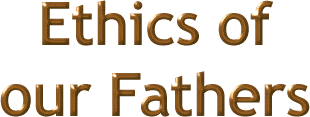Light Lines - Vayeitze
Parshat Vayeitze
11 Kislev 5760 / 20 November 1999
Ohr Somayach Home Page
The king was unhappy with his Prime Minister. Every time there was a problem in the country, whether it was a minor hiccup or a major disaster, the Prime Minister would say. �It�s all for the best!� The king would cringe before the Prime Minister�s irrepressible optimism and scowl.
One day things came to a head. The king was out hunting. An ill-aimed sword wielded by one of his courtiers sliced off the king�s little finger. As the king shrieked and howled in pain, the Prime Minister chirped �It�s all for the best!� The king was livid. �Take him and throw him in the dungeons!� ordered the king, �I can�t stand his infernal cheerfulness one moment longer!�
The days past, and the months too. The Prime Minister languished in jail for a year. And then two. It looked like he would finish up his days with nothing to console him save his irrepressible optimism.
It happened after two years that the king went out on another hunting party with his court. Unbeknownst to them, a dangerous tribe of pigmy cannibals had invaded the king�s northern border � exactly where the hunting party found themselves. and the entire hunting party was caught in a gigantic net. The following morning they were all destined to be a five-star pygmy cannibal breakfast.
Day broke, and one by one the luckless courtiers were led to the pot. The pygmies, of course, saved the greatest delicacy for desert, the king. They led him out from the stockade into the unforgiving glare of the morning sun, tied his legs together, and just when they were about to tie his hands together one of the pygmies let out a squeal of alarm. The king had no pinkie. Where his little finger was supposed to be was... nothing. Now, everyone knows that according to Pygmy law, only a perfect and whole human may be eaten. Someone who has even the slightest physical blemish is inedible.
Unceremoniously, the pigmies sent the king back to his palace. He immediately rushed to the prison and ordered the release of the prime minister. Telling him of his miraculous escape, the king begged forgiveness from his prime minister. But all the prime minister would say was �It�s all for the best!� The king looked at the prime minister with great remorse and said, �I just took away two years of your life � how can you say it�s all for the best?!� �If I hadn�t been in prison,� replied the prime minister �I�d have been out hunting with you!�
When Rachel saw her sister Leah standing under the wedding canopy with Jacob, her intended husband, she must have felt like her life was coming to an end. And yet she was silent. She must have thought that Jacob would never marry her, after her betrayal of his confidence. He would probably resign himself to marriage with Leah and accept it as Divine Providence. Besides, it was highly unlikely that Jacob would marry two sisters. And yet she was silent.
But Jacob did marry her. And they had two children, Joseph and Benjamin.
Every decorative stone in the breastplate of the High Priest represented one of the tribes of Israel. The stone of the tribe of Benjamin was called yashpheh. These same Hebrew letters also spell yesh peh. There is a mouth, a mouth closed in silence.
Esther was also from the tribe of Benjamin. She saved the Jewish People by silence. By not revealing her Jewishness to King Achashverosh, she was able to thwart Haman�s plan of genocide, in the story of Purim.
Esther didn�t get her power of silence from nowhere. It came from Rachel. When Rachel stood and watched the chupah of her sister in silence, she planted a power into her offspring which would eventually save the entire Jewish People.
�It�s all for the best!�
|
Ohr Somayach Home Page |
 Selections from classical Torah sources which express the special relationship between the People of Israel and Eretz Yisrael Har Hazeitim - Mount of Olives This famous mountain, referred to in the Talmud as Har Hamishcha (Mount of Oil), was where the Red Heifer was slaughtered and burned so that its ashes could be used in purifying Jews who had become ritually impure through contact with the dead. Ironically, it is today most identified with the dead because its slope, east of the Temple Mount, contains the oldest Jewish cemetery in the world. It is on this mountain where the Redeemer�s feet shall stand, says the Prophet Zechariah, in his vision of the climactic battle which will take place at the end of days, when all the nations gather to make war against Jerusalem: �Har Hazeitim shall be split along the middle by a great valley running from east to west.� |
Light Insight | Love of the Land | Ethics from our Fathers | Response Line Ohr Somayach Home Page |
One who does his learning of Torah in a manner which includes the teaching of others is guaranteed success not only in his teaching but in his learning as well. Although he sacrifices time from his own learning he will not lose out as a result, because G-d will bless him with the wisdom he seeks. G-d will open his mind and free him from any obstacles that might prevent him from understanding everything clearly. He will then supply him with proper students and attentive peers, and endow him with a power of expression to further impart his wisdom to others.
Light Insight | Love of the Land | Ethics from our Fathers | Response Line Ohr Somayach Home Page |
Testing Testing
Ben Waldbaum wrote:
I heard someone advise a student at my university that they can say, �I will study five Torah verses this week if You, G-d, give me an �A� on an exam.� Is someone allowed to say this? If it is allowed, why is it not considered testing G-d?
Dear Ben,
Did he mean that he will study the Torah verses first, and as a result he expects G-d to reward him with an �A� on the exam? If so, this is considered testing G-d and is forbidden. (One may test G-d only in regard to giving tithes and charity.)
Or did he mean that if he gets an �A� he will then study five Torah verses? If so, this is not testing G-d. Rather, it�s like a conditional vow. It�s like saying: �If I get an A, then I vow to study five verses. But if not, then not.�
In this week�s Torah portion, Jacob made a conditional vow: �Jacob took a vow saying: If G-d will be with me... give me bread to eat and clothes to wear, and I return in peace to my father�s house... then this stone which I have set up as a pillar shall become a house of G-d....� (Genesis 28:21-2).
However, a person should not make vows, because the punishment for breaking a vow is very severe. Furthermore, making a vow smacks of arrogance, like saying, �I�m so perfect that, not only do I fulfill 100% of my obligations to G-d, but I�m even taking on extra obligations!�
Produced by the Office of Communications
Editor: Raphael Scott Leban
Production: Eliezer Shapiro
Light Insight: Yaakov Asher Sinclair
HTML Design: Michael Treblow
HTML Production: Eli Ballon
© 1999 Ohr Somayach International - All rights reserved. This publication may be distributed to another person intact without prior permission. We also encourage you to include this material in other publications, such as synagogue newsletters. However, we ask that you contact us beforehand for permission, and then send us a sample issue.
This publication is available via E-Mail
Ohr Somayach Institutions is an international network of Yeshivot and outreach centers, with branches in North America, Europe, South Africa and South America. The Central Campus in Jerusalem provides a full range of educational services for over 685 full-time students.









